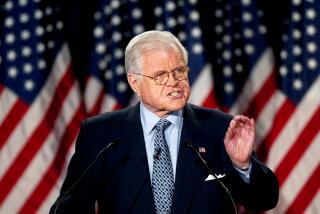McGeorge Bundy; Advisor to Two Presidents in 1960s
- Share via
BOSTON — McGeorge Bundy, who as national security advisor to Presidents John F. Kennedy and Lyndon B. Johnson played a key role in the Cuban missile crisis, the Bay of Pigs invasion and the military buildup in Vietnam, died Monday at 77.
He died at Massachusetts General Hospital of a heart attack, said Jim Rowe, a Harvard University spokesman and family friend.
Bundy was a Republican and a young dean at the College of Arts and Sciences at Harvard when Kennedy tapped his boyhood schoolmate to become one of his “best and brightest.” Bundy served as special assistant for national security from 1961 to 1966.
“He was intelligent, really trustworthy. People always had confidence in Mac,” said John Kenneth Galbraith, a Kennedy economic advisor and ambassador to India. “The United States and the world have lost one of their senior citizens.”
Bundy supervised the staff of the National Security Council and was among a group of young, bright advisors that Kennedy had called on, including Theodore Sorensen and Arthur Schlesinger Jr.
“We were not surprised when John Kennedy asked him to go to Washington [and] he accepted,” said former Harvard President Nathan Pusey, who had hired Bundy. “He could have had as magnificent a career in higher education as he did in other things.”
It was Bundy who in 1962 broke the news to Kennedy while the president was still in his bathrobe and slippers: “Mr. President, there is now hard photographic evidence . . . that the Russians have offensive missiles in Cuba.”
The Cuban missile crisis had begun.
After leaving government, Bundy was president of the Ford Foundation for 13 years and then was a professor of history at New York University for 10 years.
From 1990 to 1993 he worked at the Carnegie Corp. of New York and was chairman of its committee on reducing nuclear danger. He was a scholar in residence at the Carnegie Corp. at the time of his death.
Bundy also was known as a scholarly author, and was described by the late Learned Hand as “the brightest man in America.”
Bundy won a Pulitzer Prize for his 1988 book, “Danger and Survival: Choices About the Bomb in the First 50 Years.” The 600-page work, part history and part memoir, traced the decisions about nuclear weapons from 1941, when President Franklin D. Roosevelt first ordered a serious effort to build an atomic bomb, to 1988, when the United States and the Soviet Union agreed to limit intermediate-range missiles in Europe.
Even at the outset of the ‘90s, Bundy confidently predicted an end to the Cold War and some demilitarization. He voiced the opinion in the spring of 1990 when he visited UC Irvine to deliver the school’s first Julius Margolis speech, sponsored by the university’s Center for Global Peace and Conflict Studies.
Always an optimist, Bundy had said for years that the threat of nuclear war lessened with each decade after World War II, because of governments’ knowledge of its potential for world destruction. He customarily argued that a first-strike nuclear attack could well prompt a smaller--not larger--nuclear attack in response.
A small response would be enough, he said in Los Angeles in 1989, “to demonstrate the urgency of an immediate cease-fire, and such an immediate cease-fire--no matter who had gained or lost what before the nuclear exchange began--is the best available next step for both sides.”
Bundy dismissed as “pretty silly” any suggestion that the reunification of Germany might prompt a resurgence of German military might. He believed that nuclear power was a deterrent, and that Germany would decline to get involved, knowing three nearby neighbors already possessed nuclear stockpiles.
Bundy frequently visited Santa Monica to envision “war games” centered in the Persian Gulf and elsewhere and discuss the consequences with researchers at Rand Corp.
His other books included “On Active Service” in 1948 and “The Strength of Government” in 1968.
Bundy graduated from Yale in 1940, and served as an Army intelligence officer during World War II. He joined the Harvard faculty in 1949 and in 1953 became the youngest dean of the faculty of arts and sciences, serving until 1961.
More to Read
Sign up for Essential California
The most important California stories and recommendations in your inbox every morning.
You may occasionally receive promotional content from the Los Angeles Times.













